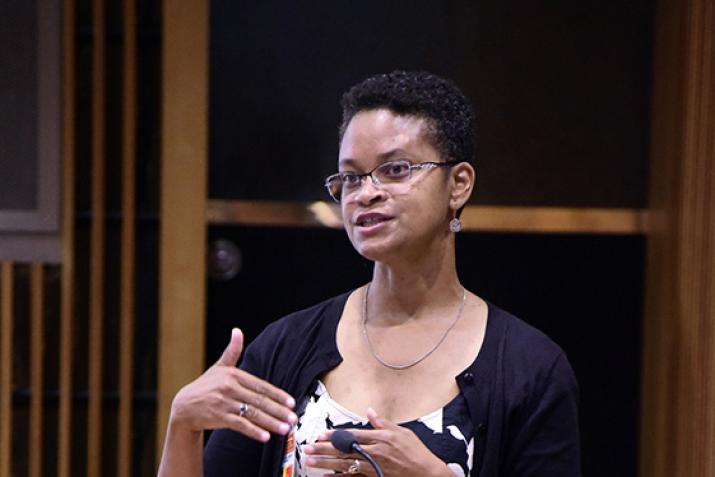When Tonia Poteat, Ph.D., joined the Duke School of Nursing in July 2023, she was quite literally coming home. A North Carolina native, she attended the North Carolina School of Science and Math, just four blocks from where she now lives.
"It feels like a full circle opportunity to apply my training and experience to my local North Carolina community,” says Poteat, a professor of nursing who co-directs the Sexual and Gender Minority Wellness Program at the Duke Global Health Institute (DGHI).
The scope of Poteat’s work, however, extends far beyond Durham. Over the past two decades, she has emerged as one of the leading experts on transgender health, both through her clinical practice and her innovative research focusing on the health inequities experienced by LGBQ and transgender communities. A specialist in HIV treatment and care, she has been certified as a gender specialist by the World Professional Association for Transgender Health and co-leads a transgender health working group for the Center for AIDS Research.
Michael Relf, interim dean of the School of Nursing and a DGHI faculty member, describes Poteat as one of the most influential thought leaders on transgender health, noting that “her work has become even more critical as politics continue to jeopardize the public's health."
Both in the U.S. and globally, transgender communities are facing a rising tide of discrimination and stigma. Many U.S. states and countries have passed laws limiting access to gender-affirming care, barring transgender athletes from competing on teams that align with their gender, or limiting discussion of gender identities in schools. Such measures, which Poteat says are often fueled by transphobia and political scapegoating, are driving significant gaps in healthcare access and outcomes for transgender communities.
“We’ve imposed a gender framework that has made any sort of gender transgression costly emotionally, physically and financially. This is the price people pay for being their authentic selves in a world that has not allowed space for gender diversity,” she says.
Poteat describes her work as seeking “strategies to advance health justice” for these marginalized communities. Her projects include research with the first transgender-specific healthcare center in South Africa, where she is evaluating the relationship between gender affirmation and HIV care engagement. She also works domestically to provide financial support and peer mentoring for transgender people facing hardships.
Poteat began focusing on LGBTQ health as an undergraduate student at Yale University, where she worked to help respond to the HIV crisis. As a volunteer for the AIDS Project in New Haven, Connecticut, she learned that the HIV movement was about not only health, but also the rights of the LGBTQ community.
In the following years, she began providing gender-affirming care for transgender people in New York City, where she discovered how little information and access there was for this kind of care. Seeing the need for more clinical research to inform transgender care, she earned a doctorate at Johns Hopkins University, where she pursued research on epidemiology and transgender health.
“As a scientific community, we have had a failure of imagination in terms of how we study gender,” she says.
Working with the transgender community has offered Poteat a front row seat to the evolution of the public's conversation around gender and sex. She describes "the complete invisibility of non-binary people" in her early working years. She recalls a time when a patient contacted their health insurance company to learn whether gender-affirming care would be covered, only to be met with confusion about whether such care even existed.
“The need to describe the possibility of living as a transgender person has evolved into increased visibility of this community, leading to both benefits and vulnerabilities for this group,” she says.
She notes the benefits of finding community and allies can be outweighed by the negativity from the intense political weaponization of transgender identities. "The mental and physical wounds of those actions are devastating and lasting," she says.
"Trans people don't have to live in one of the states refusing care, or even be actively seeking care, to be harmed by the hatred and discrimination,” she says. “From the space of a cis person, I can model acceptance and share knowledge. I can absorb vitriol that comes my way in this line of work in a way that is less harmful than it might be for a trans person.”
It’s this spirit of compassion that compelled Poteat to come back to Durham. She was drawn by Duke’s focus on social determinants of health and commitment to advancing social justice. She also likes that the Sexual and Gender Minority Wellness Program, which was launched in 2022, takes an interdisciplinary approach, drawing on experts in medicine, nursing, global health and even engineering.
The result, Poteat says, will be “a full-throttle approach to health equity.”


